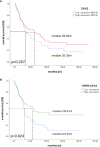G Protein-Coupled Estrogen Receptor Correlates With Dkk2 Expression and Has Prognostic Impact in Ovarian Cancer Patients
- PMID: 33679613
- PMCID: PMC7933595
- DOI: 10.3389/fendo.2021.564002
G Protein-Coupled Estrogen Receptor Correlates With Dkk2 Expression and Has Prognostic Impact in Ovarian Cancer Patients
Abstract
Purpose: Wnt pathway modulator Dickkopf 2 (Dkk2) and signaling of the G protein-coupled estrogen receptor (GPER) seem to have essential functions in numerous cancer types. For epithelial ovarian cancer (EOC), it has not been proven if either Dkk2 or the GPER on its own have an independent impact on overall survival (OS). So far, the correlation of both factors and their clinical significance has not systematically been investigated before.
Methods: Expression levels of Dkk2 were immunohistochemically analyzed in 156 patient samples from different histologic subtypes of EOC applying the immune-reactivity score (IRS). Expression analyses were correlated with clinical and pathological parameters to assess for prognostic relevance. Data analysis was performed using Spearman's correlations, Kruskal-Wallis-test and Kaplan-Meier estimates.
Results: Highest Dkk2 expression of all subtypes was observed in clear cell carcinoma. In addition, Dkk2 expression differed significantly (p<0.001) between low and high grade serous ovarian cancer. A significant correlation of Dkk2 with the cytoplasmic GPER expression was noted (p=0.001) but not for the nuclear estrogen receptor alpha (ERα) or beta (ERβ). Patients exhibiting both, high expression Dkk2 (IRS>4) and GPER (IRS>8), had a significantly better overall survival compared to patients with low expression (61 months vs. 33 months; p=0.024).
Conclusion: Dkk2 and GPER expression correlates in EOC and combined expression of both is associated with improved OS. These findings underline the clinical significance of both pathways and indicate a possible prognostic impact as well as a potential for treatment strategies addressing interactions between estrogen and Wnt signaling in ovarian cancer.
Keywords: Dickkopf 2; G protein-coupled estrogen receptor; Wnt signaling; epithelial ovarian cancer; estrogen.
Copyright © 2021 Fraungruber, Kaltofen, Heublein, Kuhn, Mayr, Burges, Mahner, Rathert, Jeschke and Trillsch.
Conflict of interest statement
SM received research support, advisory board, honoraria and travel expenses from AstraZeneca, Clovis, Medac, MSD, PharmaMar, Roche, Sensor Kinesis, Tesaro, and Teva. FT declares research support, advisory board, honoraria and travel expenses from AstraZeneca, Medac, PharmaMar, Roche, and Tesaro. SH reports grants from Baden-Württemberg Ministry of Science, Research and the Arts, from StuRa Ruprecht-Karls-University of Heidelberg, FöFoLe LMU Munich Medical Faculty, grants from FERRING, personal fees from Roche, other from Astra Zeneca, grants from Novartis Oncology, grants and non-financial support from Apceth GmbH, non-financial support from Addex and grants from Heuer Stiftung. She further reports grants from Deutsche Forschungsgemeinschaft within the funding program Open Access Publishing, by the Baden-Württemberg Ministry of Science, Research and the Arts and by Ruprecht-Karls-University Heidelberg, outside the submitted work. TK receives a grant from the Friedrich-Baur-Stiftung. The remaining authors declare that the research was conducted in the absence of any commercial or financial relationships that could be construed as a potential conflict of interest.
Figures



References
-
- du Bois A, Reuss A, Pujade-Lauraine E, Harter P, Ray-Coquard I, Pfisterer J. Role of surgical outcome as prognostic factor in advanced epithelial ovarian cancer: a combined exploratory analysis of 3 prospectively randomized phase 3 multicenter trials: by the Arbeitsgemeinschaft Gynaekologische Onkologie Studiengruppe Ovarialkarzinom (AGO-OVAR) and the Groupe d’Investigateurs Nationaux Pour les Etudes des Cancers de l’Ovaire (GINECO). Cancer (2009) 115(6):1234–44. 10.1002/cncr.24149 - DOI - PubMed
Publication types
MeSH terms
Substances
LinkOut - more resources
Full Text Sources
Other Literature Sources
Medical
Molecular Biology Databases

